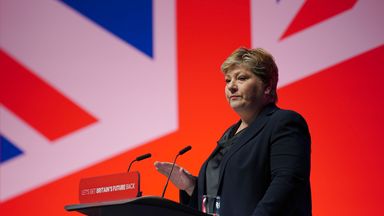Campaigners' claims that there has been a rise in the number of suicides since restrictions were placed on puberty blockers is not supported by data, a review has found.
A report published by the Department of Health and Social Care (DHSC) said discussion of the issue online had been "insensitive, distressing and dangerous" and had gone against guidance on the safe reporting of suicide.
Health Secretary Wes Streeting - who has said he supports the current temporary ban on puberty blockers - tasked independent adviser Professor Louis Appleby with reviewing NHS England data on suicides by young patients of the now-closed Gender Identity Development Service (GIDS) at the Tavistock and Portman NHS Foundation Trust.
The review by Professor Appleby, the chair of the National Suicide Prevention Strategy Advisory Group, followed campaigners' claims at the weekend that the ban on puberty blockers - which pause the physical changes of puberty such as breast development and facial hair - had "put young trans people's lives at risk".
Professor Appleby's review also referred to claims made of "an explosion" of deaths following an earlier restriction of puberty blockers in the wake of a 2020 High Court ruling, as well as "multiple references to children dying in future because they are unable to access puberty-blocking drugs".
He said the claim was "said to be based on unpublished data provided by two members of staff at the Tavistock, described as whistleblowers".
And he concluded that the available data from NHS England, based on an internal audit by the Tavistock of deaths among current and former GIDS patients from 2018 to 2024, did not back up the claim.
He said there were 12 suicides across the six years - half aged under 18 and half aged 18 or above.
In the three years leading up to 2020-21, there were five suicides, compared with seven in the three years after.
Professor Appleby said: "The patients who died were in different points in the care system, including post-discharge, suggesting no consistent link to any one aspect of care. They had multiple social and clinical risk factors for suicide.
"However, it is likely that there has been a rise over a longer period as young people at risk have increasingly presented with gender dysphoria and referrals to GIDS have risen."
Keep up with all the latest news from the UK and around the world by following Sky News
Tap hereThe report noted that GIDS saw a sharp increase in referrals of young people, with more than 5,000 in 2021-22 compared with just under 250 a decade earlier.
In 2022, the NHS confirmed it would shut down its gender identity clinic for children and young people at the Tavistock. The clinic closed at the end of March this year and was replaced by two regional hubs in London and the North West.
The health service's decision came off the back of the interim findings of a review led by Dr Hilary Cass.
In her final report published in April, Dr Cass found there was "remarkably weak evidence" to support gender treatments for children.
The paediatrician criticised the current system on gender identity services for children and young people and made 32 recommendations, including that gender services operate "to the same standards" as other children's health services and that the policy on giving children testosterone or oestrogen from age 16 should also be urgently reviewed.
In March this year, NHS England confirmed children would no longer be prescribed puberty blockers at gender identity clinics except to those who participate in clinical research trials.
Two months later, Victoria Atkins, the former health secretary, used powers in the Medicines Act 1968 to stop private or European organisations from prescribing puberty blockers to people aged under 18 if the drugs were intended to assist gender dysphoria or gender-affirming healthcare.
In his review, Professor Appleby said one risk of the social media discourse was that young people and their families will be "terrified by predictions of suicide as inevitable without puberty blockers - some of the responses on social media show this".
He said the claims made did not meet "basic standards for statistical evidence", adding that "to be reliable, evidence should be objective, unbiased and open to independent scrutiny".
Read more:
Global IT outage hits companies around the world
Starmer unveils plan to stop illegal migration crisis 'at source'
He argued that "puberty-blocking drugs have come to be seen as the touchstone issue, the difference between acceptance and non-acceptance" - something he described as "unfortunate".
A Department of Health and Social Care spokesperson said decisions on children's healthcare "must follow the evidence at all times" and said the government was "committed to ensuring children questioning their gender receive the best possible multidisciplinary care, led by expert clinical guidance".
"It is vital that the public discussion around this issue is handled sensitively and responsibly," they added.
Anyone feeling emotionally distressed or suicidal can call Samaritans for help on 116 123 or email jo@samaritans.org in the UK. In the US, call the Samaritans branch in your area or 1 (800) 273-TALK
Disclaimer: The copyright of this article belongs to the original author. Reposting this article is solely for the purpose of information dissemination and does not constitute any investment advice. If there is any infringement, please contact us immediately. We will make corrections or deletions as necessary. Thank you.



